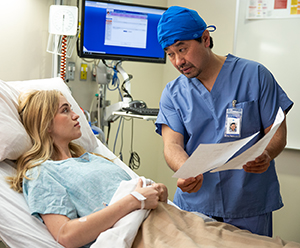Hospital Discharge: What to Expect
Hospital discharge is when you are released from the hospital after treatment. You will be discharged when you no longer need to be in a hospital for your care. But this does not mean that you are fully healed or recovered. You may have a health condition that still needs attention and care. You may be able to go home. Or you may need to go to another type of facility, such as a rehabilitation facility or skilled nursing facility.
Discharge planning
Many hospitals have a discharge planner. This person helps coordinate the information and care you will need after you leave. The discharge planner will make sure you:
-
Understand your injury or illness
-
Know the next steps to take, such as taking medicine or caring for a bandage (dressing)
-
Know who to contact if you have a question or a problem
Where you will go next
You may still need to get care after leaving the hospital. After discharge, you will go through a transition of care. That means you will now have a different level of medical care outside of the hospital. You may go to:
-
Another facility. You may go to a skilled nursing facility for continuing medical care. Or you may go to a rehabilitation facility for physical rehabilitation. Healthcare providers at these places will keep in touch with the hospital. This is to help make sure you get the treatment you need.
-
Your home or the home of a family member. You or a family member will work with your healthcare providers to manage your care at home. A home care agency may send healthcare providers to your home. These people will give you tests or medicines as needed and check on your recovery. They can also help you arrange help at home as needed.
No matter where you go after discharge, follow all the instructions from your healthcare providers. This will help prevent problems that can send you back to the hospital.
Getting ready for your discharge
Before you start the discharge process, ask for paper and a pen or pencil. Make a list of all of your questions. When asking questions, write down the answers. Make sure your questions are fully answered. If English is not your first language, ask for help with the language. Ask for printed information about your discharge. You may also want to ask a family member or friend to be with you during the discharge process. You will also need to arrange a ride home. If you are being transferred to a skilled nursing facility, you will likely be sent in an ambulance.
Important information at discharge

During the discharge process, your healthcare team will give you the information you need to make the transition. Make sure you have all the information you need. Don't hesitate to ask questions. Your medical team should discuss all of the following with you:
-
Your medical condition at the time of discharge
-
What kinds of follow-up care you will need, such as physical therapy
-
What medicines you need to take, including why, when, and how to take them, and possible side effects to watch for. How this list is the same and different from the medicines you were taking before you were admitted to the hospital.
-
What medical equipment you will need, and how to get it
-
When and how you will get test results
-
Instructions on what you can eat and drink
-
What exercise you can or should do
-
What activities you should not do
-
What you can expect at your new facility, if you’re not going home
-
Phone numbers to call if you have a question or problem
-
Instructions about when you should call
-
Dates and times of your follow-up appointments, or information about how to make appointments
Making sure your healthcare providers communicate
When you leave the hospital, the hospital team will need to communicate with the next set of healthcare providers about your care needs. Ask the hospital when this will occur. Make sure your new healthcare providers have all the information they need before your first follow-up appointment. Without this information, they will not be able to give you the care you need.
After you are discharged
After you leave the hospital, you will need to make sure to take care of yourself as instructed. This will help ensure you don’t need to go back into the hospital. Carefully follow all of the instructions from your healthcare provider. If you have a question about your follow-up care, call to ask. If you’re concerned about problems, make sure to call with questions. This can help prevent problems from getting worse.
Make sure to keep all of your follow-up appointments. When you go to an appointment, be ready to tell your healthcare provider how you have been feeling. Bring copies of any tests results. Ask questions about any part of your recovery or care.
Let family members or friends be a part of your recovery after discharge. They may be able to pick up medicines or take you to appointments. They may remember things that you forget about symptoms, problems, or questions you want to ask. This can help you have a smoother recovery after discharge.
For more information
For helpful tools on being prepared and involved in your healthcare, visit the Agency for Healthcare Research and Quality website at www.ahrq.gov/questions/resources/index.html